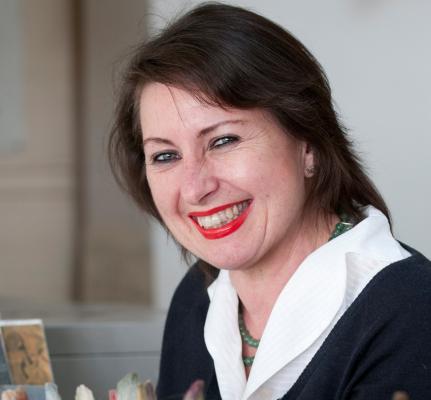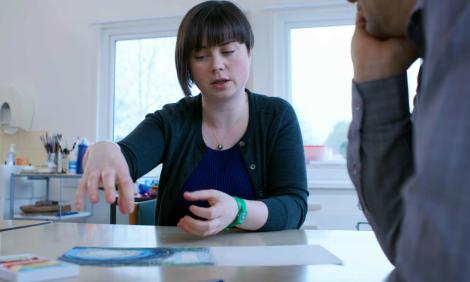Art therapist/art psychotherapist
Art therapy is a form of psychotherapy that uses art media as its main mode of expression and communication. Art therapists/art psychotherapists use art as a medium to address emotional issues which may be confusing and distressing.
Working life
You'll use art to help people deal with complex and confusing emotional issues. There may be things which clients cannot say in words. This could be because the emotions are too distressing or because the client has difficulties with communication.
You'll create a secure environment which helps people build their self awareness and self confidence.
You'll work with people of all ages - children, young people adults and the elderly. Your clients may have a range of difficulties such as emotional, behavioural or mental health problems, learning disabilities, life-limiting conditions, neurological conditions or physical illnesses. They also work in a variety of settings such as:
- NHS
- social services
- education (primary, secondary, further and special education)
- prisons
- private practice.
You'll work one-to-one or in groups, depending on the needs of the client. In a group, you'll encourage members to relate to each other through their art and help the group work through the images and their meanings.
You may work with other professionals including medical and health care staff, teachers or prison and probation staff.
Francesca La Nave
Art pyschotherapist
Read Francesca's storyI am proud that art psychotherapists work with some of the most difficult-to-reach patients in mental health services.

How to become an art therapist
You need to do an approved full or part time Masters degree in art therapy or art psychotherapy and then register with the Health and Care Professions Council (HCPC).
Entry requirements
You'll usually need a first degree in art or a relevant subject. You may be accepted onto a course without an art degree, if you have a strong art background. Those accepted onto the courses are usually mature, flexible people who have had experience of working in mental health, education, special needs or social services before applying. You will need to show a portfolio of your art work. They cover the psychology of image making, therapeutic relationships, the importance of boundaries and psychological and psychotherapeutic practice.
Degree apprenticeship
A level 7 apprenticeship for arts therapists, including art therapists/art psychotherapists, dramatherapists and music therapists is available but opportunities are currently limited. You'll need to apply for an apprentice position with a health care provider. You can search for vacancies on the NHS Jobs website and Find an Apprenticeship website.
Skills and personal qualities needed
You'll need to be:
- creative, flexible and resourceful
- resilient in dealing with other people’s strong emotions
- sensitive and mature
- artistic with excellent communication skills
- able to work with people from all walks of life
- able to reflect on your own emotions
Where the role can lead
You could specialise in a particular type of client such as children, the elderly or offenders. Or you could become a specialist in a particular issue such as dementia, mental health or palliative care. You could decide to become self-employed and build up a private practice. You could do this alongside employed work.
You could become a senior or consultant art therapist, managing the work of a team of therapists. Or you could become the head of an arts therapy department, coordinating the work of therapists from other disciplines such as music or dramatherapists. You also train other art therapists. Some art therapists complete further training and specialise in areas such as working with families or people with a diagnosis of personality disorders. There are also opportunities for further training in psychotherapy or in evidence-based interventions such as Cognitive Behavioural Therapy (CBT).
You can join the British Association of Art Therapists (BAAT) where you can keep your skills and knowledge up to date with annual CPD (continuing professional development). BAAT runs courses, conferences and seminars where therapists can exchange ideas and update their skills.
Pay and benefits
Most art therapists in the NHS work part-time hours and posts typically start at band 6 of the Agenda for Change pay rates. You’ll also have access to our generous pension scheme and health service discounts, as well as 27 days of annual leave plus bank holidays.
Displaying 6 - 10 of 30 matches
-
Master of Music Therapy
Nordoff Robbins
View courseOpens in a new window
- Study mode
- Full-time
- Duration of the course
- 2 years
- Leading to a career in
- Art, Music or Drama therapies
- Contact details
- education@nordoff-‐robbins.org.uk 020 7267 4496
- Region
- London
- Admissions address
- 2 Lissenden Gardens
London
NW5 1PQ
-
MA in Integrative Arts Psychotherapy
London, The Institute for Arts in Therapy and Education
View courseOpens in a new window
- Study mode
- Part-time
- Duration of the course
- 3 years
- Leading to a career in
- Art, Music or Drama therapies
- Contact details
- [email protected] 020 7704 2534
- Region
- London
- Admissions address
- 2-18 Britannia Row
Islington
London
N1 8PA
-
MA in Dramatherapy
University of Derby
View courseOpens in a new window
- Study mode
- Full-time
- Duration of the course
- 2 years
- Leading to a career in
- Art, Music or Drama therapies
- Contact details
- [email protected] 01332 594198
- Region
- East Midlands
- Admissions address
- Britannia Mill
Mackworth Road
Derby
Derbyshire
DE22 3BL
-
MA in Art Therapy
University of Derby
View courseOpens in a new window
- Study mode
- Full-time
- Duration of the course
- 2 years
- Leading to a career in
- Art, Music or Drama therapies
- Contact details
- [email protected] 01332 594016
- Region
- East Midlands
- Admissions address
- Britannia Mill
Mackworth Road
Derby
Derbyshire
DE22 3BL
-
MA in Art Therapy
University of Hertfordshire
View courseOpens in a new window
- Study mode
- Full-time
- Duration of the course
- 2 years
- Leading to a career in
- Art, Music or Drama therapies
- Contact details
- [email protected]
- Region
- East of England
- Admissions address
- College Lane
Hatfield
Hertfordshire
AL10 9AB





